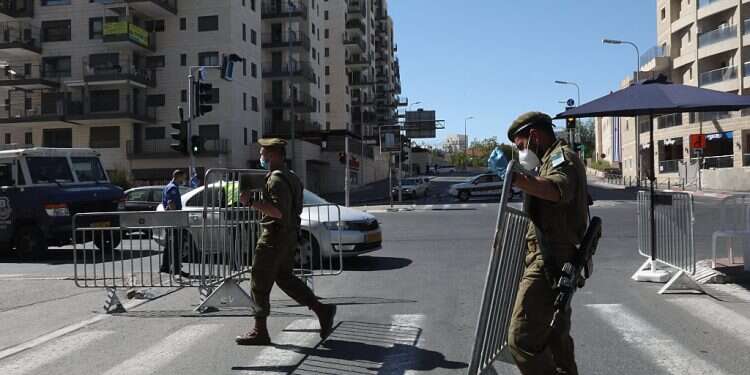The Corona cabinet has approved a list of cities, towns, and neighborhoods designated "red" under the traffic light system in which a nighttime curfew will be instated in an attempt to stop the spread of coronavirus in those communities.
Most of the cities and towns on the list are home to mainly Arab or Haredi populations.
Follow Israel Hayom on Facebook and Twitter
Under the terms of the curfew, which will be in effect from 7 p.m. until 5 a.m., residents will be prohibited to be more than 500 meters [yards] from their homes, except for urgent purposes. School will be cancelled, with the exception of special education. Businesses, other than food stores and pharmacies, will be required to close at 7 p.m.
During the day, when the curfew is not in effect, gatherings will be limited to 10 participants in enclosed spaces and 20 participants for open-air events.
The list approved on Tuesday includes the following cities, towns, and local authorities:
Abu Sanan; Umm al-Fahm; the Shachmon neighborhood of Eilat; Elad; Ashdod (the Gimmel, Zayin, and Chet neighborhoods); Ashkelon (Mitzpe Barnea, Gani Barnea, Neot Barnea, Givat Zion, and Karmei Zion); Buka'ata; Beit Shemesh; Bnei Brak; Nujeidat; Baqa al-Gharbiyye; Sderot (Naot Yitzhak Rabin, Naot Hanevi'im); Julis; Jaljulia; Jatt; Daliyat al-Carmel; Abatan; Taibe, Tira; Yafiyya; Jerusalem (Kafr Aqab, Beit Hanina, Ramat Shlomo, Ramot, A-Tur, Issawiya, Anata, Shuefat, Sanhedria); Qisra, Kafr Bara; Kafr Manda; Kafr Qasim; Kafr Bara; Laqiyya; Musrifah; Salam; Nazareth; Netivot; Ein Mahal; Ussifiya; Arara; Furedeis; Kalansawe; Reina; Rechasim; and Shfaram.
Following the cabinet's decision, Eilat Mayor Meir Yitzhak Halevi responded, "We have succeeded in fighting a lockdown in the city and we are working to change the decision to instate a curfew in the Shachmon neighborhood, which makes no sense."
Meanwhile, updated figures from the Health Ministry indicate that a record 3,425 new cases have been identified since Monday. The percentage of the over 40,000 tests processed that came back positive stood at 8.4%.
Subscribe to Israel Hayom's daily newsletter and never miss our top stories!
As of Tuesday morning, there were 467 coronavirus patients hospitalized in serious condition. After midnight Monday, two additional patients succumbed to the virus, bringing Israel's death toll since the start of the epidemic to 1,031. There were 134 patients on ventilators.
In a special interview to Israel Hayom, the coordinator of the government's efforts to fight the spread of the virus, Professor Ronni Gamzu, warned that the upcoming High Holidays would be unusual.
Gamzu discussed his traffic light plan, which color-codes cities, towns, and local authorities based on the rate at which the virus is spreading there so that appropriate action can be taken.

"The traffic light plan is a powerful tool against the virus. It changes the discourse. Instead of handling the virus at the national level, you incentivize local authorities to battle it in their own towns. Look at what a discourse it created, with every local authority fighting and saying, 'We're not red!'"
"It's a shame they didn't do it four or five months ago," Gamzu added.
Gamzu says his campaign has prompted "red" cities and towns to "not only understand the current restrictions, but also to accept additional ones if it remains red."
Touching on the decision to enact a nighttime curfew in "red" communities, which drew criticism over the virus "not differentiating between day and night," Gamzu said, "Anyone who laughs about that doesn't understand epidemiology. People contract coronavirus at night – at leisure venues and weddings. In the Arab sector, we needed a nighttime closure, not a daytime one. Of course, it is possible to become infected during the day. A nighttime curfew is used elsewhere in the world, it's not an Israeli invention. The idea of a nighttime curfew was designed to stop weddings, which give us 500 new cases a day."
Gamzu also said that the upcoming holidays would not be "normal holidays."
"We do want to cut down on gatherings and extended family meals. Coronavirus spreads at gatherings where people eat. It's a classic outbreak event all over the world. There will be a recommendation to hold back. What we will recommend is under discussion. There will be a recommendation to cut down on gatherings and avoid the endless round of meals. The steps taken need to be precise and not overbearing," he explained.




